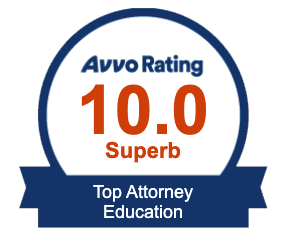Now after a long summer, school has begun again in Georgia schools. For most parents, the beginning of the school year is uneventful. Your children look forward to reuniting with their classmates from last school year or look forward to making new friends as they move from elementary to middle school, or middle school to high school, or they just change schools or school systems. For other parents, however, a new school year brings with it apprehension and anxiety. Will my child make educational progress this year? Will the school system do a better job of insuring that my child receives a free appropriate public education than last school year? Will the IEP team properly implement my child’s IEP? Will I need to change my child’s individualized educational program (IEP) this fall if things go badly? These are just a few thoughts and worries that some parents of children with disabilities will have as school begins in August.
Already I have received phone calls from a few parents who have expressed these concerns or others like them. For example, I spoke to one parent who met with the IEP team towards the end of last school year and was frustrated with the lack of progress, services, and accommodations her child did not receive. We will meeting next week with the IEP team to address the parent’s concerns and other issues that are important for the child’s special education instruction, programming and services. I will be attending another IEP meeting at the end of September for a parent who had many concerns about his son’s IEP and accommodations last school year. I had other parents who called and are lining up IEP meetings for this fall because they want to address their concerns of what went wrong last school year and hopefully not repeat these mistakes again this year. What many of these parents have in common is that the IEP team did not listen or respond positively to the parent’s concerns expressed at the last IEP meeting. What will be different this time? They will be bringing a special education attorney to the IEP meeting with the goal of achieving a better result for their child. In my experience, many parents are frustrated with the way IEP team members treat them at an IEP meeting. they feel discounted, not heard, and often ignored. They are frustrated the IEP team members will not make the changes they propose to their child’s IEP. Sadly, it is my experience that many IEP teams do not respond well to parental concerns without an advocate or special education attorney present at the IEP meeting. Why? I cannot read the minds of IEP team members at each meeting. But I sense that IEP team members do not take the parents’ concerns as seriously unless there is a watchdog so to speak – an advocate or special education attorney present at the meeting. Some parent fear that bringing a strong advocate or special education attorney to an IEP meeting will make things worse and little will be accomplished. The opposite is usually true in my experience. The IEP team is on its best behavior and is more willing to make compromises and adopt parental changes, and other proposals for their child’s IEP. Advocates and special education attorneys can use the carrot-and-stick approach at an IEP meeting and try to work out parental concerns amicably. If the IEP team does not respond and is adverse to the parental concerns then the advocate or special education attorney can sue the stick approach and proverbially hit the IEP members on the head with the stick. How can they do this?
In the parental rights booklet or pamphlet that parents receive at all IEP meetings, there is a listing of parental rights they can exercise against a school system when there is a dispute concerning the eligibility, identification, evaluation and provision of a free appropriate public education to the child. See 20 U.S.C. 1415. A parent can file, for example, a state complaint against the school system when they believe their child has not received a free appropriate public education. 34 C.F.R. 300.151 et seq. A parent can request mediation of the dispute. 34 C.F.R. 300. 506. A parent can file a request for a due process hearing. 34 C.F.R. 300. 507. A parent can request an independent educational evaluation. 34 C.F.R. 300. 502. A parent can file a complaint with the U.S. Department of Education, Office for Civil Rights for violating of their child’s rights under the Americans with Disabilities Act, or Section 504 of the Rehabilitation Act of 1973. See 34 C.F.R. 104.30-104.37. Whether any one or more of these parental rights is appropriate for your child depends on many factors. You should consult with a special education attorney for legal advice on what parental right may be beneficial for you to exercise for your child. Please remember that not all parental rights may be suitable for your case. Some parents request a due process hearing without the advice and assistance of an attorney and find they are overwhelmed at the complexity and difficulty of due process procedures and requirements. I would strongly recommend that parents at least speak to a special education attorney first before deciding whether a due process hearing is the most effective way to resolve a dispute with the school system.

